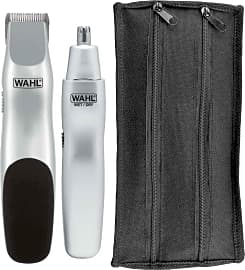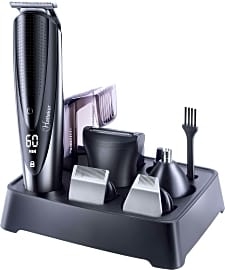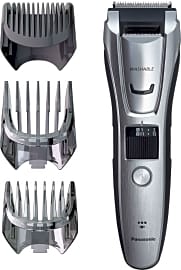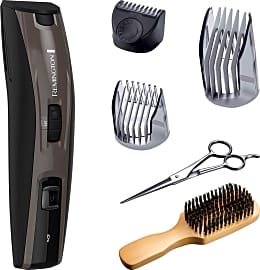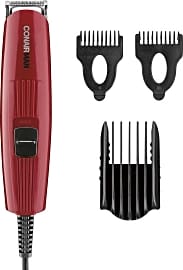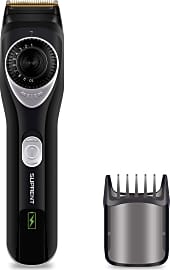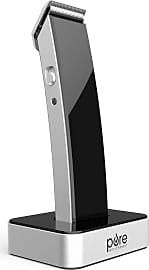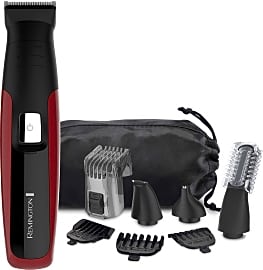The 10 Best Beard Trimmers

This wiki has been updated 38 times since it was first published in May of 2015. Keeping your facial hair well-groomed doesn’t make you a yuppie or a self-absorbed hipster — it makes you look sharp and professional. One of these beard trimmers will help you appear both stylish and rugged at the same time, and there are models that are suitable for wet trimming, dry trimming, and a variety of hair lengths. Some even come with stands and travel pouches. When users buy our independently chosen editorial choices, we may earn commissions to help fund the Wiki.
Editor's Notes
April 15, 2021:
If you don't want to shave daily or use a razor then a good-quality beard trimmer should be an invaluable part of your grooming kit. They have highly adjustable blade guards that allow trimming of practically any length, from designer stubble and detailing lines to shaping a full beard. Not only that, these trimmers often include a variety of attachments for tidying up other bodily hair, such as in the nose and ears.
During this update, we ensured that our recommendations are still the best options available and made changes where necessary. A new addition is the Remington MB4700 Smart, a digital model that boasts a motorized comb adjustment with 175 length settings. It also has a memory function for storing your preferences, and is controlled via an illuminated touchscreen. Similar to the Hatteker Facial, it can also be charged via USB, making both of these models ideal for traveling.
If you want a versatile trimmer that can also be used to give a haircut or tidy up other parts of the body, then the Remington PG6155C comes with plenty of attachments, including a dual-sided body hair trimmer. The Panasonic ER-GB80 features a slide-up detailing trimmer, designed for mustaches and sideburns. With the Wahl Groomsman, a separate trimmer for the nose and ears is included in the 17 piece kit. And finally, the Philips Norelco Multigroom 5000 is an 18 piece kit with accessories for face, head, and body styling. A three-hour lithium-ion battery, a powerful motor, and maintenance-free blades all combine to make this model one of our top picks.
January 03, 2020:
Beards are experiencing a renaissance as of late. Movie stars, athletes, and businessmen can all be seen sporting considerable scruff. Of course, a winning beard doesn't just materialize out of thin air. You need to care for your facial hair just as you would the hair on your head; that is, you have to groom it regularly and shape it to complement your best features.
The trimmers in this list are, by and large, easy to use, versatile, and portable. Many come with extra attachments that make it possible to achieve a highly customized look in a short period of time, and without any special barbershop training. It is important to condition your beard hair, though, as it is coarse and can be particularly vulnerable to breakage. Beard oils and washes can help you get your facial situation back on track.
With regard to updates, the Hatteker Professional has been replaced with the Hatteker Facial, and the Suprent Kit was replaced with the updated Suprent Adjustable. The Pure Enrichment TRYM and Wahl Groomsman are the two other new additions to the list. Unfortunately, the Philips Norelco Multigroom 7000 and Surker Clipper got the ax due to multiple quality complaints.
Special Honors
Brio Axis Don't be fooled by its sleek appearance — this model packs a punch. It comes with a small charging dock that won't take up too much space on your bathroom counter, in addition to multiple attachments and a bottle of cleaning solution. Its ceramic blade glides remarkably smoothly over skin. brio4life.com
Lawn Mower 2.0 This nifty little device features a hypoallergenic blade, a USB charging cable, and two adjustable guards that give you the freedom to groom wherever and however you want. There's also a cleaning brush that makes it easy to keep your trimmer good-as-new. manscaped.com
The Behavior Of A Beard Trimmer
Manual hair clippers were a grind, however, and they lacked precision.
The beard trimmers of today are powered by an electric motor, which is, in turn, powered by some type of battery or outlet. The internal motor is used to propel two rows of parallel razors oscillate, back-and-forth, like jagged teeth, across one another. Cutting in rapid succession, these teeth trim blades of hair based upon desired length (AKA a "length setting"). An electric beard trimmer may have anywhere between 1-50 length settings. Each setting is based on how far the oscillating blades are when the edge of a trimmer makes initial contact with the face.
The philosophy behind an electric trimmer has been around since the 1800s. Early manual clippers operated on a similar principle, with a person squeezing two fingers together (a la a pair of scissors) to get the razors to cross. Manual hair clippers were a grind, however, and they lacked precision. This problem was solved by an independent manufacturer named Leo Wahl, who invented the original electric beard trimmer back in 1921.
Seize The Trimmer, But Don't Let It Seize
To find a suitable trimmer, ask yourself whether you're in the market for a precise shaver, or a device that you can use while on the go. If you're a cosmetologist, or you plan on using the electric trimmer professionally, you'll also want to look into whether the blades have any history of irritating certain types of skin.
If you're purchasing a trimmer for personal use, it's helpful to research the trimmer's battery source; as a trimmer's battery runs low, the razors could begin to seize. Short of carrying a charger around with you, the best bet is to purchase an electric trimmer that uses lithium-ion power. Lithium-ion batteries are known to last 6 to 10 times longer than any average rechargeable type. These batteries also keep the trimmer buzzing at full power, which means you can mow straight through stiff clumps of hair in less time.
The History Of The Electric Trimmer in America
The first electric hair trimmer was patented by Leo Wahl, an independent manufacturer from Illinois, in 1921. Up to that point, people were using what were known as manual hair clippers. These clippers were operated by squeezing two metal handles together, causing a pair of oscillating razors to cross. Manual hair clippers were dangerous, however, and exhausting for the performer. So Wahl simplified the process by replacing the metal handles with a motor.
The first electric hair trimmer was patented by Leo Wahl, an independent manufacturer from Illinois, in 1921.
Seven years after Wahl's invention, Jacob Schick received the original patent for an electric razor. Ten years following, Remington mass-produced the first electric razor that was sold in America. At around the same time, Philips, Co. introduced what we now recognize to be the three-blade-rotating system. It's worth noting that all of this was occurring toward the end of the Great Depression, which makes it remarkable that each of these companies - Schick, Wahl, Remington, and Philips - are still considered leaders in the industry today.
Today's electric beard trimmer features a lot of technological advances. Certain models can include an LED display, electro-chemical engineering, and anywhere from 1-50 length settings (among other highlights). With an eye toward the future, the grooming industry has even begun to experiment with electrolysis. Imagine a laser being an integral part of your electric beard trimmer's design.



